For every reason to learn a language -let’s just say Vietnamese for example-, there is a corresponding method. Some learn for work, some learn for want, and some learn for war. But no matter how or why you want to learn Vietnamese, it requires joining a club.
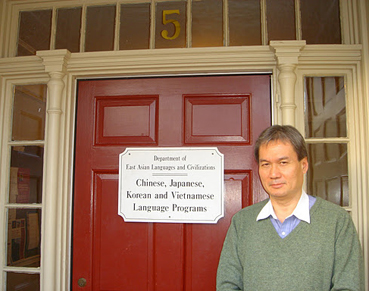
Learning a language is to join a club. One way to learn Vietnamese is to become a student of Ngo Nhu Binh at Harvard.
Harvard was our first colonial and ever since our national university, the one the world knows about. We demand the best from Harvard.
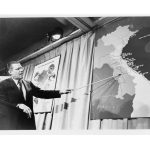
We didn’t get it in the 1960s. The Best and the Brightest, the famous story of Americans in the Vietnamese civil war, tells how a bunch of Harvards nearly destroyed this country interfering in the affairs of that one.
Of course, its author David Halberstam was a Harvard man. So was Ngo Vinh Long who did as much as anyone to educate the United States about Viet Nam while the war raged.
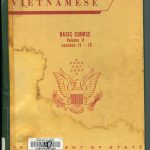
At that time, Americans were learning Vietnamese chiefly in the military and at State. Even at universities they followed a method devised for special troops dropped into the China, Burma and India theater of the Pacific War.
You drill with a native speaker under the supervision of an academic linguist who might not speak the language at all. It works because the Army selects students who are good with puzzles, remember sounds and have musical ability.
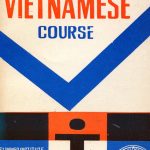
They are paid to study full-time for six to eighteen months under command to succeed both individually and as a group. Like I said, learning a language is to join a club.
Another path was trod by an American born to missionaries in China, David Thomas. He went to Viet Nam to learn Vietnamese so he could speak with hill people to translate the Bible into their own languages.
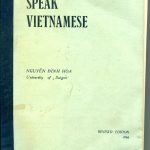
You bring Christ to people by deed and speech as well as text. The Summer Institute of Linguistics’ beginning Vietnamese manual is a pamphlet of conversations the missionary may practice with a friend.
Meanwhile, working both in Saigon and in the United States, Nguyen Dinh Hoa developed a method for civilians. He was both a linguist and a native speaker.
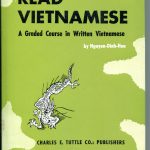
Hoa taught soldiers and diplomats but he reached out to the public of university students and self-starters. His publisher, Tuttle, arose from the ashes of the Pacific War selling books to English-speaking managers, professionals and salesmen.
All that is far behind us. As the United States and Viet Nam reconciled over the 1990s, Harvard brought dozens and hundreds of Vietnamese officials to Cambridge to train as global professionals and managers.
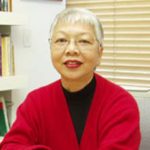
The Kenneth T. Young Professor of Sino-Vietnamese History, Hue-Tam Ho Tai, and her students started study after study with colleagues in Viet Nam. While visiting the Southeast Asia Studies Summer Institute she recruited Binh to teach Vietnamese at Harvard.
Binh had spent Cold War years at Moscow earning a doctorate in Russian linguistics and teaching Vietnamese language and linguistics to Soviet and Warsaw Pact students. Linguistics is the science of the humanities that rises like a lotus from mud.

Capitalist or socialist mud: the great university critic of the United States adventure in Viet Nam was the ascending linguist of that time, Noam Chomsky. Binh is a linguist in the same sense Noam is, of exact and systematic inquiry.
His first book gives sustained attention to phonetics, how Vietnamese speak. In asides, Binh tells the student how his language works and provides useful proverbs of the people.
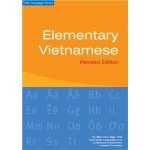
Binh’s students at Harvard influenced the book. He wrote lessons as they prepared to study in Viet Nam.
Most were not diplomats, missionaries, soldiers or even planning to study Viet Nam as a profession. Most students of Vietnamese in the United States are learning the mother tongue of their parents.
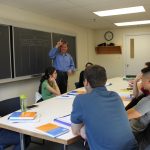
Heritage students often make up the intermediate class. They are confident with the sounds and basic conversations of Vietnamese.
Intermediate texts from wartime drill further on dialogues as Franklin Huffman & Tran Trong Hai and Nguyen Dinh Hoa do or develop job skills. To-Lan Vu & William P. Hyde teach transcription and Laurence C. Thompson & Nguyen duc Hiep and Robert M. Quinn offer reading practice.
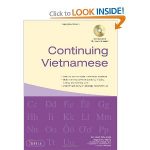
Binh’s new Continuing Vietnamese carries on the student’s introduction to a world of bright young Americans drawn to visiting Viet Nam. Lesson plans include original presentations as at a club meeting.
There are other intermediate texts that enroll you in different clubs. Australia National University developed Nguyen Bich Thuan’s with that country’s matey egalitarianism and regional involvement in Viet Nam.
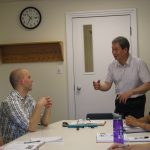
That Vietnamese is a language means that anyone can learn it anywhere. Noam’s productive observation is that each of our brains can do this.
Links throughout this post will take you to different resources for your brain and this link at UCLA offers many more. But you will want to join a club like the classes offered by Binh and his colleagues at the other GUAVA universities.
— Dan Duffy, Editor of Viet Nam Literature Project, where this post first appeared
Please take the time to rate this post (above) and share it (below). Ratings for top posts are listed on the sidebar. Sharing (on email, Facebook, etc.) helps spread the word about diaCRITICS. And join the conversation and leave a comment! How did/do you learn Vietnamese? What club did you have to join in the process?



A recommendation is to do language exchange via skype. There are a lot Vietnamese students dying to practise English with a native. Get a text and direct your own learning. You’ll need to take care that you don’t let exhange tilt too much English. Not so sure about white guys just trying to get Vietnamese girls. Zero language is needed for that. The ones most interested in a white guy speak English.
BlogBlarg: Everyone who wants to learn needs to start somewhere. For anyone who is completely new, perhaps the best initial step is to read menu items at various Vietnamese restaurants. That’s how my American-born Vietnamese nephews and nieces started learning. All words in Vietnamese have only one syllable, but not all words have a definite meaning all by themselves. It’s good to understand the meaning behind what each word of a restaurant dish means. One can also purchase Vietnamese karaoke DVDs. This helps with pronunciation and provides a general idea how VN sentences are structured. Finally, if you are living near a community with a large Vietnamese population, you will likely see community colleges offering courses in Vietnamese.
Wow it sounds like you have found your club. Great work! My post on Binh also leads to some language texts that your monk friends would be hard put to call Communist. Best wishes, sounds like you already know more Vietnamese than I do.
Clubs and classes have proved to be difficult for me because they are full of white men who are learning Vietnamese so they can get in the pants of cute Asian girls. I tell myself “at least they’re straight up about their intentions,” but ultimately I can’t stand to be in the same room with them.
My favorite and best teachers are the parents and grandparents of my elementary school students. Sometimes the kids try to help me out as well, but mostly they are embarrassed about their language and even more embarrassed and grossed out (they’re kids, after all) that I would want to learn it.
My most consistent teacher is the woman who colors my hair. Monk friends have tossed aside texts I acquired (from Amazon for formal classes at a local language academy) telling me they are “Communist books.” I have Rosetta Stone, and I pick up random children’s texts whenever I find them; those are good for vocab but have little info about the structure of the language.
As I am hopelessly tone deaf, Viet people laugh openly at my attempts to communicate and my best friend has given up on my efforts completely, shutting me down when I hint at straying from our banter in English.
I know I’ll never master this thing, but how many white people do you see even trying to talk to old Viet grandparents or encouraging the little kids to maintain their home language? I suspect that in the part of the US where I live, Vietnamese spoken and written by second and third generation immigrants is going to be a rarity. Bring on the clubs!